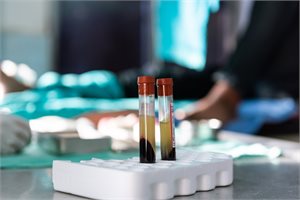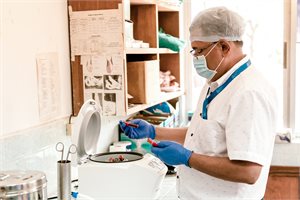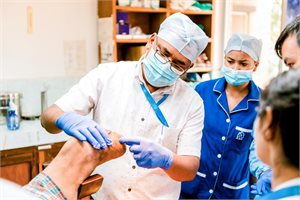
L-PRF: the pioneering new treatment for ulcers bringing life-changing healing to leprosy patients
The Leprosy Mission’s Anandaban Hospital in Nepal has long been a beacon of hope and love for people suffering with the effects of leprosy.
People whose lives have been rocked by fear and rejection find a place where compassion and care abound. And, alongside this kindness, sits innovation and the discovery of medical miracles.
Dr Indra Napit, Senior Surgeon at Anandaban, has developed a revolutionary technique to treat leprosy patients suffering from ulcers that have slashed the time it takes these wounds to heal.
Ulcers are very common among leprosy patients, with around 20 per cent of people who have leprosy being at risk of developing one. Because leprosy attacks the nerves, it steals the gift of feeling in the areas affected. When you or I feel a stone in our shoe, we remove it. But for people affected by leprosy, they may not feel it damaging their skin or causing an ulcer.
After a patient has their first ulcer, it is common for ulcers to recur for the rest of the person's life. This has a long-lasting effect on not only their body, but their lives.
Being away from their job for long periods of time will lead to loss of income. This means looking after their loved ones and affording to pay for food and home becomes a daily struggle.
Ulcers, if not treated successfully, can become badly infected. In severe cases, amputation is the only solution to ensure the patient’s life is saved.
The Leukocyte & Platelet Rich Fibrin (LPRF) Procedure
The encouraging news is that Dr Indra has pioneered a brand new life-changing treatment. It heals deep ulcers and cuts down healing time significantly for leprosy patients.
It’s called the Leukocyte & Platelet Rich Fibrin (LPRF) procedure. Doctors take a sample of the patient’s own blood, spin it in a centrifuge to extract the plasma and red cells, then allow it to clot before flattening it into a thin “patch”. This is then applied to the surface of the ulcer. Staff then bandage the patient’s ulcer and the process is repeated weekly.



With this new treatment, hospital admission time is reduced drastically from six to eight months to only eight weeks!
It also means Anandaban Hospital can have greater capacity to treat more leprosy patients and continue to offer a lifeline to people affected by leprosy.
